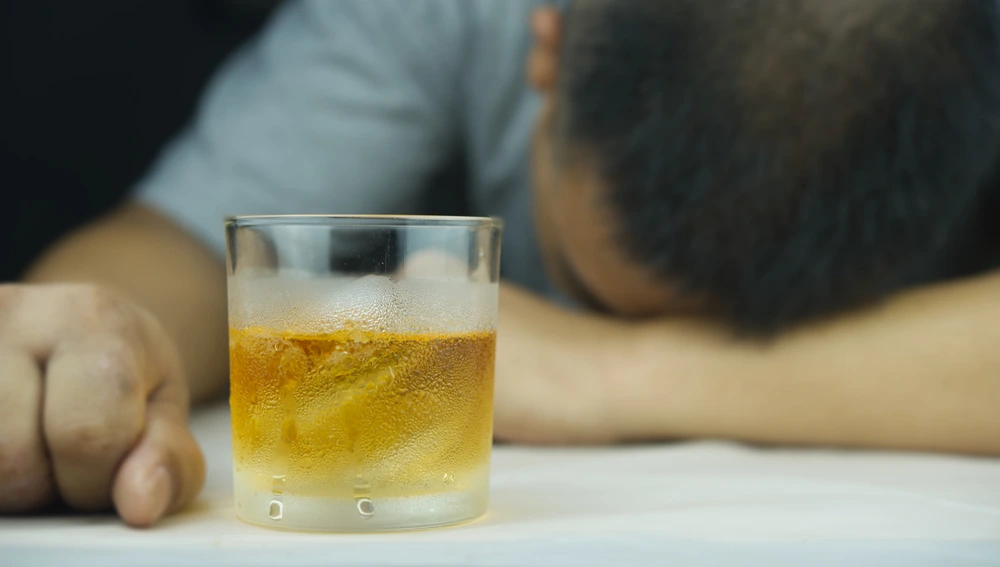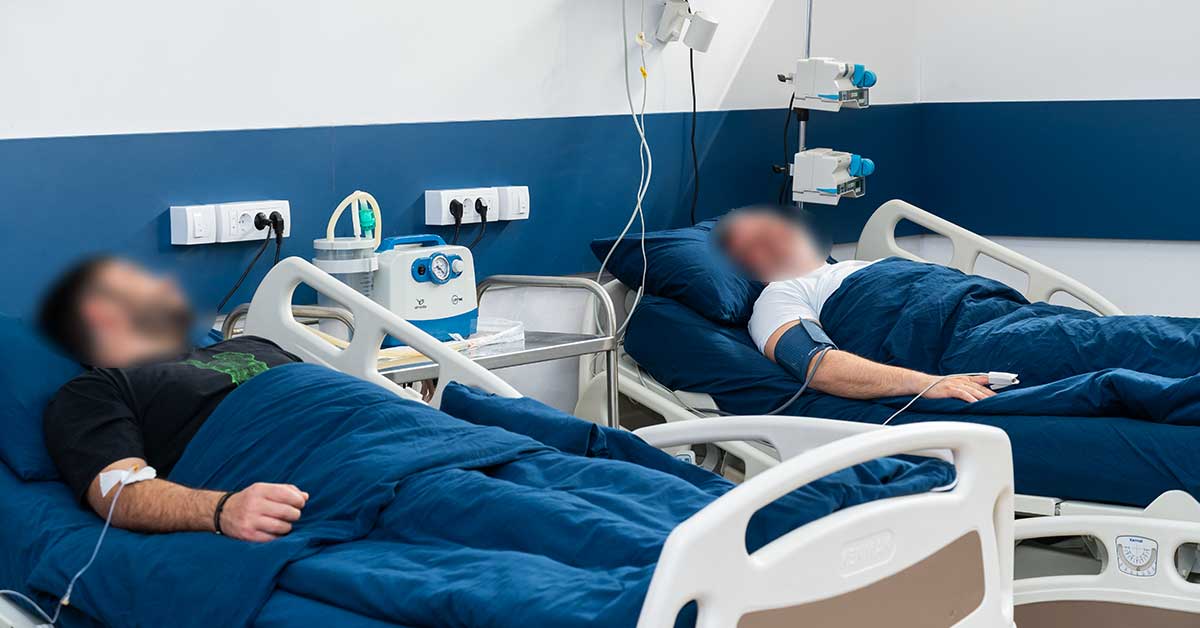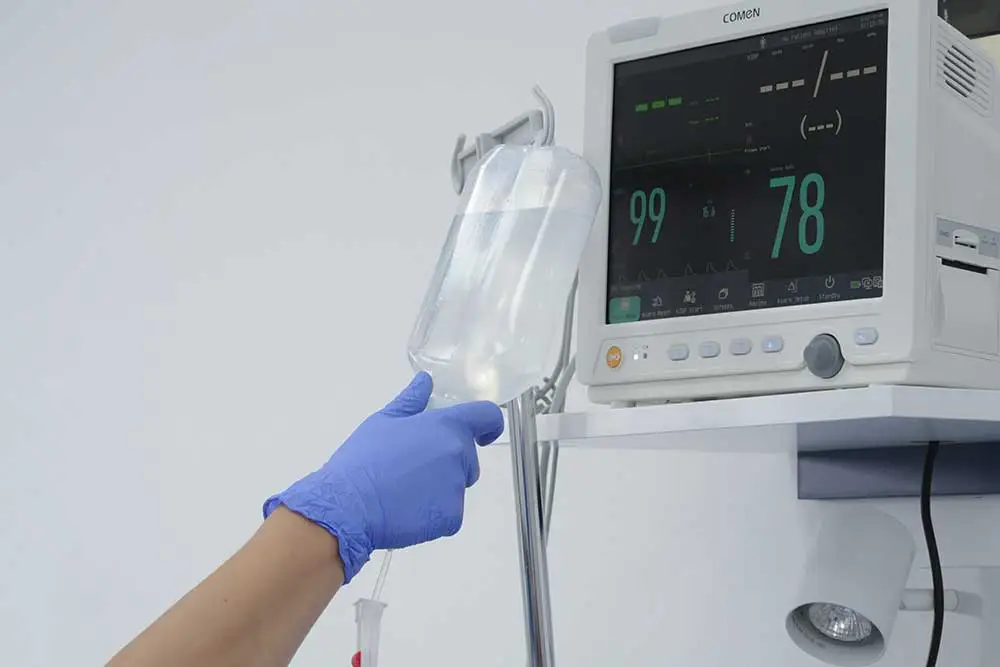Alcohol is a legal and widely available substance that lowers inhibitions and causes a range of harmful effects. Because it is legal and easy to obtain, many people mistakenly believe that alcohol is not dangerous. In fact, a large number live under the illusion that alcohol isn’t even a drug. The reality, however, is quite the opposite. Those struggling with alcohol dependence know this all too well and experience its consequences first-hand. Once alcohol becomes a habit – and that habit turns into a destructive addiction – quitting becomes anything but easy.
Chronic, excessive, and uncontrolled drinking almost always leads to alcoholism. It is a form of addiction that is extremely difficult – if not impossible – to overcome without help. Of course, not everyone who drinks is an alcoholic. But when a person loses control over their drinking and alcohol begins to dictate their behaviour, it is clear they are suffering from an alcohol use disorder.
Medically proven and reliable alcohol withdrawal is the only way to break free from this vice for good.
Alcoholism is a complex and progressive illness that gradually takes hold and destroys not only the life of the individual but also the lives of their loved ones. People slip into alcoholism slowly and gradually – as the saying goes, “cup by cup”. Even those struggling with alcohol addiction often say that, looking back on their first drink or their first experience of being drunk, they could never have imagined that they would one day become dependent on alcohol. In fact, many believed it could never happen to them.
By the time a person reaches the stage where they cannot go a day without alcohol – unable to function normally without it in their system – the search for solutions usually begins. At that point, both the individual and their family often start asking questions such as: “ How can you give up alcohol?”, “What is the easiest way to stop drinking?”, or “Is there a natural cure for alcoholism?”
In the following text, find out how to recover from alcohol dependence and what a medically verified detox looks like. Discover what effective and efficient alcohol withdrawal really involves.
Why is quitting alcohol difficult?
Alcohol use disorder and alcoholism can lead to a wide range of physical, psychological, and social consequences. These include weight gain, alcohol-related liver disease, domestic violence, loss of income, and even death. When alcoholism reaches its full extent, the journey towards quitting alcohol can become extremely difficult and complex.
The main reason it is so hard for an alcoholic to stop drinking lies in the intense craving for alcohol. Specifically, when a person suddenly and abruptly stops consuming alcohol, they experience unpleasant symptoms of alcohol withdrawal – a crisis we will explore in more detail later.
During an alcohol crisis, the individual often resorts to drinking again in an attempt to avoid or relieve the unpleasant and painful withdrawal symptoms. However, this time, the amount of alcohol consumed is usually even greater. The widespread availability of alcohol further complicates the withdrawal process, as it makes relapse far more likely and accessible.
Numerous studies have examined the question of why quitting alcohol is so difficult. A shocking fact is that alcohol withdrawal is often more challenging than withdrawal from many other psychoactive substances. The way alcohol affects the brain – and the changes caused by prolonged exposure to ethanol – may help explain why giving up alcohol is such a difficult and demanding task.
Alcohol and Three Major Changes in the Brain
1) Dopamine Release
One of the first changes that occurs in the brain – contributing to alcohol addiction and making it difficult to quit – is the stimulation of dopamine release . Alcohol, as a psychoactive substance, influences the production of this neurotransmitter, which plays a key role in regulating feelings of pleasure and reward.
The release of dopamine affects the brain’s reward system, reinforcing the individual’s interest in and enjoyment of alcohol. As a result, people continue to drink because the brain learns to associate alcohol with positive experiences, driven by this chemical response.
2) Tolerance
As a person continues to drink heavily and frequently, another major change takes place in the brain. Over time, the brain becomes less responsive to the release of dopamine, causing the pleasurable effects of alcohol to diminish or disappear altogether. As tolerance builds, the individual must consume larger quantities and drink more often in order to “feel good.”
This marks the shift from simply “enjoying alcohol” to excessive and uncontrolled drinking. At this point, an alcohol use disorder has typically developed – a clear step towards alcoholism.
3) Compensation and Secondary Tolerance
The third major change occurs with repeated and prolonged exposure of the brain to alcohol. Alcohol is a central nervous system depressant, meaning it slows down certain brain and bodily functions. When someone drinks heavily and uncontrollably, breathing and heart rate slow down, and they may experience poor coordination and impaired judgement. Eventually, tolerance develops , and the person feels they must drink daily just to function – simply to “get through the day”.
As the brain adapts to the constant presence of alcohol, it begins to compensate for these depressant effects. It does so by increasing the activity of glutamate – one of the brain’s main excitatory neurotransmitters. In other words, the brain becomes more stimulated in response to alcohol . Over time, even when the person isn’t drinking, the brain remains in this heightened, overactive state.
This hyperactivity leads to symptoms such as disturbed sleep, anxiety, and tremors. The brain then “demands” alcohol to counteract this excitatory imbalance – relying on its sedative effects just to feel normal. As a result, the person continues to drink, trapped in a cycle of dependence.
Natural cure for alcoholism and alcohol weaning naturally – myth or truth?
Although millions of people worldwide struggle with alcoholism and alcohol use disorder, sadly only a few seek treatment. Many believe there is some miraculous natural cure for alcoholism. This naturally raises the question: is there a natural cure for alcoholism? And if so, how effective is natural alcohol withdrawal in combating the disease?
Of course, numerous articles on this topic can be found online, claiming that a natural cure for alcoholism or certain herbal drops for alcohol withdrawal can effectively prevent alcohol misuse. But is this really the case?
Alcoholism is an insidious and progressive disease that gradually and almost imperceptibly takes hold of a person’s life. It can develop over many years before the individual realises they have a problem with alcohol. In other words, alcoholism is not a condition that can be treated quickly, especially not in home settings. There are no shortcuts to alcohol withdrawal, nor are there tinctures or drops that can instantly restore a person or guarantee successful and lasting recovery.
Natural remedies for alcoholism, such as herbal teas or tinctures, are unlikely to harm the body. However, it must be clearly emphasised that natural weaning from alcohol CANNOT provide a full and lasting recovery – it cannot achieve complete and permanent withdrawal.
One of the biggest myths is that alcohol withdrawal —whether aided by natural remedies or not—can be safely done at home. On the contrary, attempting this is very dangerous, as it can lead to numerous serious complications such as paranoia, hallucinations, delirium tremens (also known as alcoholic psychosis), and cardiovascular or heart problems. In extreme cases, withdrawal can even be fatal.
Furthermore, so-called natural cures for alcoholism, including herbal medicines, demand exceptionally high levels of self-discipline and willpower. There is a common misconception that “just a little more self-control” is enough to stop drinking. However, regular and prolonged alcohol use fundamentally alters the brain’s chemical structure.
These changes to brain chemistry cannot be undone or overcome by self-control alone—especially when that very self-control has already been compromised by alcohol abuse. For these reasons, alcohol withdrawal and detoxification should always be carried out through medically proven and reliable methods , including pharmacologically tested medication for alcoholism.

How to stop drinking and deal with an alcohol crisis
“How to quit alcohol” is one of the most common questions asked by the family members or close friends of an alcoholic. Understandably, the question “how to give up alcohol for good” is also asked by alcoholics themselves, but typically only once they have reached the more advanced stages of the condition. Experience shows that alcoholics — or their families — usually seek treatment during the later stages of alcoholism. In other words, they reach out when the problem has become truly serious and poses a threat to health.
Before exploring how to give up alcohol , it is important to understand what happens when a person, after regular and compulsive drinking, is suddenly without alcohol in their system. When an alcoholic abruptly stops drinking, they may experience a condition known as alcohol withdrawal syndrome . In general, withdrawal from any psychoactive substance is difficult and unpleasant. However, alcohol is one of the few substances where withdrawal can be fatal, as the symptoms of alcohol withdrawal can be life-threatening.
The good news is that alcohol withdrawal can be safe and manageable — but only when carried out in a proper drug rehabilitation facility. In this context, it is essential that the person receives a proven and structured treatment programme. Alcohol detoxification should always be conducted under the supervision of qualified professionals.
You should never attempt to quit alcohol on your own or at home, as doing so can be life-threatening. The urge to drink again, in order to relieve the unpleasant symptoms of withdrawal, can be overwhelming.
An alcohol crisis occurs due to the body and brain developing a tolerance to the substance. In other words, the person — or rather, their body — has become physically dependent on alcohol. As previously mentioned, alcohol is a central nervous system depressant that alters brain function. Specifically, alcohol consumption increases the production of GABA (gamma-aminobutyric acid — a neurotransmitter that induces calmness and euphoria), while reducing the production of glutamate (a neurotransmitter associated with feelings of excitement and stimulation).
To restore balance, the brain gradually begins to produce less GABA and more glutamate. When a person suddenly stops drinking, the brain is, in simple terms, “confused” by the sudden change. This imbalance is responsible for the symptoms of alcohol withdrawal, such as tremors and anxiety .
The severity of these symptoms depends on several factors, including:
- How frequently the person drinks
- How long the person has been drinking
- The circumstances and manner in which they suddenly stop drinking
- The person’s overall state of health
- The presence of any co-existing psychological conditions at the time of alcohol cessation
In general, if someone has consumed large amounts of alcohol over an extended period (months or years), the intensity of alcohol withdrawal symptoms is likely to be more severe.
The safest and most effective way to give up alcohol and manage the symptoms of alcohol withdrawal
As we have repeatedly emphasised, withdrawing from alcohol at home and without professional support is never a recommended approach. This is due to the painful, distressing and often dangerous symptoms of alcohol withdrawal. Generally speaking, each individual will experience withdrawal differently — some may have more severe symptoms, others milder. However, because of the highly unpleasant nature of this condition, every person affected will naturally want to know the answer to the question: “ What is the easiest way to give up alcohol? ”
The symptoms of alcohol withdrawal can range from moderate to extremely severe, and in some cases, even be fatal. These symptoms may include:
- Anxiety
- Confusion and disorientation
- Fatigue
- Headache
- Rapid and strong heartbeat (palpitations)
- High blood pressure (hypertension)
- Insomnia and nightmares
- Irritability
- Nausea and vomiting
- Shaking and tremors
- Mood swings
- Sweating
- Loss of appetite
- Dilated pupils
Many people seeking the easiest way to give up alcohol have already experienced an alcohol withdrawal crisis. Unfortunately, due to the severity of the symptoms, they often try to avoid or ease the effects by drinking again. Having been through these distressing symptoms, alcoholics fear facing the painful withdrawal experience once more, which leads them to drink again — often more frequently and in greater amounts.
Thus, the person officially enters the vicious circle of alcoholism. In other words, drinking alcohol ceases to be a source of pleasure and enjoyment. Instead, alcohol consumption becomes a necessity to avoid the withdrawal symptoms caused by the body’s tolerance.
Most alcoholics will experience mild to moderately severe symptoms of an alcohol crisis. However, around 10 percent of all alcoholics may suffer extremely severe and life-threatening symptoms. These symptoms include:
- Raised temperature and fever
- Rapid breathing and very fast heart rate
- Excessive sweating
- Mental confusion
- Seizures
- Paranoia
- Hallucinations
How to quit alcohol forever – quitting on your own can be fatal!
It is true that sudden withdrawal from alcohol can cause fatal consequences, including death. Although this is rare, to understand how to quit alcohol for good , it is important to recognise the life-threatening conditions of an alcohol crisis.
The following situations are of concern:
1) Delirium tremens
Delirium tremens (alcoholic madness) is by far the most severe complication of alcoholism and unaided alcohol withdrawal. This condition is marked by very intense withdrawal crisis symptoms. The risk of delirium tremens in chronic alcoholics is estimated at 5 to 10 percent. In other words, on average, one in every 20 people experiencing an alcohol crisis will also develop delirium tremens.
Also, chronic alcohol addicts and those who have previously experienced alcohol crises are at higher risk of delirium tremens. Most symptoms of delirium tremens appear within 2 to 3 days after the person stops drinking.
If you or someone close to you shows symptoms of DT, it is essential to seek professional help immediately to ensure safe detoxification from alcohol as soon as possible.
Symptoms of delirium tremens include:
- Emotional distress and mental suffering
- Fatigue
- Fever and raised temperature
- Disorientation
- Hallucinations
- Hypersensitivity to sound, touch, and light
- Severe agitation and irritability
- Severe confusion
- Intense fear
- Epileptic seizures, which may lead to loss of consciousness
- Hyperthermia
- Memory damage
- Dehydration
- Drowsiness and tiredness
Delirium tremens can also be fatal. The estimated mortality rate from DT is very high – around 25 percent.
2) Seizures
Unaided withdrawal from alcohol, without supervision by medical professionals, can cause seizures that usually occur before delirium tremens. In rare cases, these seizures can be fatal. Statistics show that around a third of alcoholics who suffer seizures during an alcohol crisis will later develop delirium tremens.
Therefore, seizures during an alcohol crisis are a serious warning sign. They may indicate that delirium tremens is imminent.
3) Heart failure
Alcohol withdrawal without medical supervision can lead to serious heart problems, due to the effects of alcohol and alcoholism on internal organs. Heart failure is a particular risk if the person experiences symptoms of delirium tremens during withdrawal.
Alcohol withdrawal by hours and days
The duration and intensity of alcohol withdrawal symptoms vary from person to person. If you’re wondering “how long does alcohol withdrawal last?” , in most cases, symptoms of an alcohol crisis appear and subside within 7 days. However, they can last much longer, especially during the so-called post-acute withdrawal phase.
Many people experience alcohol crisis symptoms in three stages:
- FIRST PHASE: Begins within 6 hours of the last drink and can last up to 7 days
- SECOND PHASE: Starts within the first 48 hours and may last up to a week
- THIRD PHASE: Begins 48 hours after the last drink and may last two to three days
1) THE FIRST PHASE OF ALCOHOL WITHDRAWAL – MODERATE SYMPTOMS
In this stage, symptoms of an alcohol crisis can begin within 6 hours of the last drink, though they may appear up to 12 hours later. These symptoms are moderate but very unpleasant:
- Nausea
- Shaking and tremors
- Changes in blood pressure (usually high blood pressure)
- Anxiety
- Insomnia and other sleep issues
- Appetite problems
As mentioned, the first phase of alcohol withdrawal can last up to 7 days.
2) SECOND PHASE OF ALCOHOL WITHDRAWAL – POSSIBLE SEIZURES AND OTHER SERIOUS SYMPTOMS
Serious symptoms of alcohol withdrawal, including seizures, usually occur within the first 48 hours after the last drink. Many alcoholics going through unaided withdrawal enter this phase and experience extremely unpleasant seizures.
Even if more severe symptoms have not appeared within the first 48 hours, there is still a risk they may occur later. Alongside seizures, hallucinations may also develop during this phase. The second phase typically peaks between 24 and 72 hours after the last drink.
3) THIRD PHASE OF ALCOHOL WITHDRAWAL – DELIRIUM TREMENS
Around 50 percent of those who go through the second phase and experience seizures will almost certainly develop delirium tremens. Alcoholic madness (“drunken madness”), as part of the third stage of withdrawal, occurs between 48 and 72 hours after the last drink.
Symptoms at this stage may include sweating, confusion, fever, rapid heart rate, and high blood pressure. This is the most intense and challenging phase for the alcoholic, in terms of symptom severity.
This phase usually lasts 2 to 3 days, though cases lasting up to a week have been reported.
4) POSSIBLE FOURTH PHASE – POST-ACUTE ALCOHOL WITHDRAWAL
Some individuals may experience withdrawal symptoms over a longer period – from weeks to months after stopping alcohol. This stage is known as post-acute withdrawal syndrome.
At this point, most physical symptoms have subsided, but psychological issues such as anxiety, irritability, and persistent insomnia remain.
This phase may last for weeks, months, or even up to two years.

How to recover from alcoholism and how to quit alcohol?
As we’ve seen, any attempt to quit alcohol alone is extremely difficult and often impossible due to the severe symptoms of an alcohol crisis. Many alcoholics try home detox or turn to natural remedies, alcohol withdrawal drops, and similar methods. However, the effects in these cases are usually minimal or non-existent. Because of intense cravings and strong temptation, the alcoholic often turns back to alcohol as the only relief. This leads to the key questions – how to quit alcohol for good? And how can alcoholism be cured once and for all?
Recovery from alcoholism begins with recognising the problem and accepting that home detox is neither safe nor sustainable. As unaided alcohol withdrawal can often be fatal, it is essential to seek help from authorised and qualified institutions, where detoxification is carried out in a safe and controlled environment.
The answer to “how to recover from alcoholism” lies in the comprehensive support offered by professional alcohol withdrawal centres.
Given the widespread presence of alcohol in our culture and its easy availability, those in recovery are constantly exposed to relapse triggers. This is why authorised treatment centres must be properly equipped with effective methods to manage cravings and prevent relapse.
MedTiM is a modern, certified hospital for addiction treatment , equipped to the latest European medical standards. Our clinic is led by internationally renowned doctors with global reputations and many years of experience in treating alcoholism and all forms of addiction. With our innovative treatment programmes, personalised approach, and use of medically proven methods, alcoholism can be overcome for good.
MedTim - Fast, safe and PAINLESS alcohol detox
Alcoholism is a complex and progressive disease that poses a serious problem not only for the patient but also for their family and closest relations. Alcohol addiction destroys every aspect of an individual’s life – health, social, family, work, and finances. This is why treatment at the MedTiM clinic takes a comprehensive approach, including psychological, pharmacological, and social support. What sets us apart in alcoholism treatment is our completely SAFE and PAINLESS alcohol detox.
Alcoholism treatment programmes at the MedTiM clinic include guiding patients through safe and effective medical detoxification. Pharmacological treatment is followed by psychotherapy , aimed at changing the attitudes and habits that originally caused the problem.
Detoxification from alcohol at the MedTiM clinic is the initial and one of the most crucial stages in treating alcoholism. This important procedure helps prevent relapses caused by alcohol crises. Detoxification includes appropriate infusions, vitamins, tranquillisers (anxiolytics), and beta blockers, which are part of anti-abstinence therapy.
Alcohol detox at MedTiM aids the patient in removing toxic substances from the body more quickly! During treatment, we perform a thorough cleansing of the liver from alcohol. Detoxification supports the liver in processing and eliminating toxins and breakdown products harmful to the patient’s health.
If you’re wondering how long detoxification takes with us , it typically lasts between 2 and 4 days. The duration depends on the severity of alcoholism—how often and how long the patient drank, their general health, and any existing mental disorders. Besides fully cleansing the body of ethanol traces, detoxification aims to establish long-term abstinence and eliminate cravings and relapses.
Weaning off alcohol at the MedTiM clinic in just 7 or 14 days!
The MedTiM clinic offers patients a complete and comprehensive alcohol withdrawal programme lasting only 7 or 14 days—without substitution therapy at the end. This means we do not use long-term, ineffective, or outdated methods common in many other centres. Our goal is to deter every patient from returning to alcohol and quickly guide them towards the right path in life.
At the end of treatment and alcohol detoxification , each patient receives a unique medication against alcohol – a liquid implant, that is, a Disulfiram injection. This unique alcohol blocker protects patients completely from all effects of alcohol for a set period.
The main effect of this medication, the alcohol blocker, lies in the patient’s knowledge that consuming alcohol while under its influence will cause severe health consequences.
The effect of the Disulfiram injection lasts for 28 days, after which the patient should receive the same dose again for the following 28 days. During this time, the patient is given the opportunity, with the help of our psychologists, psychiatrists, psychotherapists, and other medical staff, to address all physical and psychological issues that may trigger cravings and the desire for alcohol.
It is recommended that Disulfiram be taken as an anti-alcohol medication and blocker for 12 months from the day of the first injection. Alongside blockers, patients are prescribed appropriate pharmacotherapy and advised to continue psychotherapy. If there are contraindications to the liquid Disulfiram implant, patients are given tablets for alcohol withdrawal – Esperal (solid Disulfiram). These unique pills have a 24-hour effect and are taken alongside prescribed regular therapy after hospital treatment.
Thanks to the Disulfiram we provide, patients have an incredible chance to quit alcohol for good. Disulfiram is a highly effective anti-alcohol drug and one of the answers to the question, “how to cure alcoholism”. However, it should be noted that alcohol blockers do not cure alcoholism completely but serve as an additional tool in treating this addiction.
Disulfiram implants are highly effective, offering superior protection during the challenging period of resocialisation following therapeutic and inpatient treatment. The procedure to insert a liquid implant is painless, simple, leaves no scars, and does not require sutures. Most importantly, the results are immediate — once implanted, the patient is protected from the effects and influence of alcohol.
Experts at the MedTiM clinic have been performing this procedure successfully for many years, proving it to be a very effective, reliable, and safe part of the alcoholism treatment programme. By preventing relapse and creating aversion, revulsion, and disgust towards alcoholic beverages , Disulfiram helps a person maintain sobriety. As a result, patients are more motivated to address the underlying problems that led to their addiction in a healthy way.

Why choose the MedTiM clinic for alcoholism treatment?
At MedTiM, patients undergo a complete treatment programme including detoxification, pharmacotherapy, rehabilitation, psychotherapy, psychostabilisation, and outpatient care—all within just 7 or 14 days, without long-term or outdated methods.
Following thorough treatment and comprehensive medical support at MedTiM , patients are ready to begin a new, healthy life—happier and more fulfilled!
Alcoholism disappears!
The patient will notice clear improvements in the quality of sleep and rest. Appetite will return to normal, while irritability, mood swings, aggression, and anxiety will disappear. The brain and body will adapt to the absence of alcohol without any crises or unpleasant symptoms.
The production of endorphins and dopamine will also normalise, allowing the patient to enjoy former activities and hobbies once again. The need and desire for alcohol will vanish completely!
Formation of aversion to alcohol
After stabilising the patient’s condition and completing psychotherapy, alcohol will no longer control their life . The patient will begin to develop a negative attitude and strong aversion to all alcoholic drinks. Every encounter with alcohol will trigger unpleasant memories and remind them of the root of their problems, increasing their aversion even further.
Moreover, the patient’s personality will be fully restored and strengthened, leading to the rejection of all harmful habits and the adoption of a healthy mindset.
The patient remains protected even after leaving hospital
By receiving a liquid Disulfiram implant (or, where appropriate, Esperal tablets for alcohol withdrawal ), any consumption of alcohol will produce no positive or pleasant effects. Instead, it will cause extremely unpleasant—and sometimes painful—reactions such as headache, nausea, vomiting, and other symptoms similar to a hangover.
The MedTiM clinic also offers outpatient treatment and support during the adaptation period, continuing for 12 months after discharge.
The patient will step into a new and healthy life—free from the desire for alcohol!
Group, systemic-family, cognitive-behavioural, and individual therapies will enable the patient to better understand the root causes of their problems. Our psychologists and psychotherapists will help make the negative consequences of alcohol use even clearer. The patient will begin to resist alcoholism and alcohol on both a conscious and subconscious level.
CONTACT US ANYTIME! WE ARE AVAILABLE 24 HOURS A DAY, SEVEN DAYS A WEEK!
Communication skills will improve, and the patient will start making sound and rational decisions. Overall, after treatment at our addiction hospital, the patient will learn to solve problems in a healthier way. They will come to accept and love themselves once again. Consequently, relationships damaged by alcohol abuse will be repaired.
Because MedTim truly cares for each patient to the fullest. Because MedTim is where new life truly begins!


